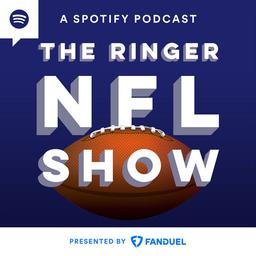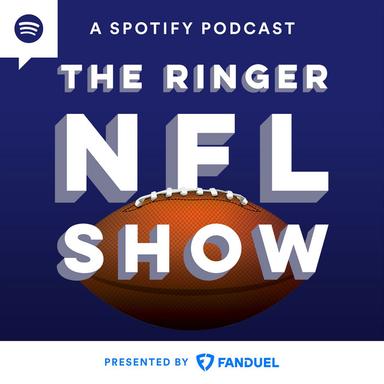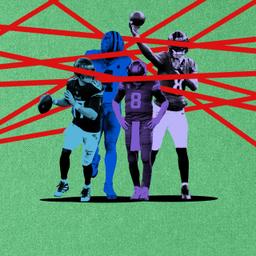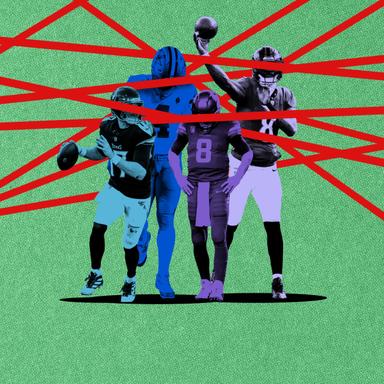Every week this NFL season, we will break down the highs and lows—and everything in between—from the most recent slate of pro football games. This week, Lamar Jackson and Josh Allen reminded us why a running game is an MVP candidate’s best friend, Jayden Daniels delivered Washington a long-overdue playoff win, and Justin Herbert flopped (again) on the wild-card stage. Welcome to Winners and Losers.
Winner: The Jayden Daniels Lore
As the stage gets bigger, Jayden Daniels’s performance remains the same. His dual-threat game that won him the Heisman Trophy at LSU in 2023 instantly translated to the pro game. The version of Daniels we saw on Saturdays in Baton Rouge looked a lot like the one we saw on Sundays this season. And in his first NFL playoff game, which doesn’t typically go well for rookies, Daniels was the best player on the field. He completed 24 of 35 passes for 268 yards and a pair of touchdowns in the Washington Commanders’ 23-20 win over the Tampa Bay Buccaneers. He didn’t throw an interception. He took just one sack for zero yards. It was as clean a game as you’ll see from a quarterback all postseason … and it came from the youngest quarterback in this playoff field.
And in what has become typical fashion throughout the season, Daniels closed out his efficient performance with a clutch game-winning drive. There wasn’t a single standout hero moment, like the fourth-down dagger he threw against Cincinnati or the Hail Mary to beat Chicago, but Daniels made every play Washington needed him to make to win the game. The Commanders have been the NFL’s most dramatic team, so of course Zane Gonzalez had to doink the game-winning field goal off and through the upright.
This season marks the most football Daniels has ever played in his life. He’s been beat up, and missed time earlier this year with a rib injury. He took some more hits in Tampa on Sunday night. Blood was literally pouring from his face at one point.
But Daniels, whose durability was questioned by geniuses like me throughout the predraft process, hasn’t slowed down after the quick start to his career. He ran right through that rookie wall and is still picking up speed heading into a divisional-round matchup against Detroit. Daniels looks more decisive in the pocket than he did earlier this season. He’s attacking the middle of the field with more anticipation. And NFL defenders look even more helpless when trying to chase him down.
Five months into the season, Daniels is still improving. We saw the best version of him to date against the Buccaneers on Sunday, which shouldn't come as a surprise. If you’ve been watching all season, you know Daniels always saves his best for last.
Winner: Buffalo’s New Formula
The Buffalo Bills had the Denver Broncos beaten before they even took a lead in Sunday’s 31-7 wild-card round win. It became clear that Buffalo had the upper hand with just four minutes left in the first quarter, when running back James Cook and the Bills offensive line, particularly left tackle Dion Dawkins, turned what should have been a 5-yard gain into a 16-yard chunk play by bullying their way through the heart of Denver’s defense.
Cook capped off that drive with a 5-yard touchdown plunge that gave the Bills a 10-7 lead, and they never trailed again. And that stampeding run in the clip above was just a preview of how the game would play out on that side of the ball for the next three quarters, with the Bills loading up the field with big bodies and simply overpowering the Broncos front repeatedly. The AFC East champs racked up 210 rushing yards on 44 carries and won the time-of-possession battle by more than 20 minutes. After rookie quarterback Bo Nix stunned the rowdy Highmark Stadium crowd with a moon-shot 43-yard touchdown throw on Denver’s opening drive, it felt like the Broncos offense was hardly on the field. For Denver to have any chance of pulling off the big upset, the offense needed to be putting together long drives, but it couldn’t stay on the field, and the defense couldn’t keep Josh Allen and the Bills offense off it.
“The things we felt we needed to do on the road to win, we didn’t do nearly well enough,” Broncos coach Sean Payton said of the loss. “We never really had an answer to stop their running game. So when you’re playing a game like that, you’re not rushing the passer nearly as much as you’ve been accustomed to. So now it’s run [and] play-action. I thought we struggled on first-down defense.”
We’re only 300 words into this, and I’ve barely mentioned Allen, which is a testament to how well this game went for Buffalo. The dominant run game, called by two former Payton protégés in Buffalo offensive coordinator Joe Brady and offensive line coach Aaron Kromer, made the quarterback’s job simple. Allen mostly played the role of distributor but still contributed a handful of superstar plays, including his improvised touchdown throw to Ty Johnson in the back of the end zone to essentially finish off an overmatched Broncos team.
That’s been the offensive formula in Buffalo all season. The Bills still routinely ask Allen to put that cape on when the offense falls behind the chains, but thanks to this new, dynamic run game, which is powered by the league’s most underrated offensive line, that isn’t happening nearly as often as it used to. And Allen has responded by playing the best football of his career.
Of course, Allen and Buffalo’s run game may need to be even better next weekend, with Lamar Jackson and the Ravens headed to Buffalo for the divisional round in a showdown of MVP candidates. Baltimore has created a similar offensive environment for its superstar quarterback, and it has yielded similar results. So much will be made about the quarterback battle, but like Sunday’s bout for the Bills, the game will be decided in the trenches.
Winner: Baltimore’s Unstoppable Duo
The Ravens also spent their wild-card game running through their opponent’s face in their 28-14 win over Pittsburgh and finished with a box score that was straight out of service academy football: 299 rushing yards on 50 attempts. The effort was led by Derrick Henry’s 186 yards, two touchdowns, and tone-setting stiff-arm that planted Pittsburgh safety Minkah Fitzpatrick into the M&T Bank Stadium turf in the first quarter.
Then in the third quarter, Henry broke the game open and left the Steelers’ entire defense in his dust on this 44-yard touchdown run.
It’s difficult to take your eyes off Henry on these runs, but rewatch those highlights and focus on the effect Lamar Jackson has on the Steelers defense. In both instances, three Pittsburgh defenders initially went running toward the Ravens quarterback, creating just enough of a crease for Henry to break into the open field.
Defending the Ravens’ running game is like playing an impossible game of Whac-A-Mole, as the Steelers learned over their last two games against Baltimore. In Week 16, Pittsburgh’s defense sold out to keep the ball out of Jackson’s hands on option plays, and Henry finished with 162 yards on 24 carries. Jackson was limited to 22 yards on nine carries that day, but the Ravens cruised to a 34-17 win and forced Pittsburgh to rethink its defensive strategy for this wild-card matchup. Mike Tomlin’s team went with the opposite approach this time, sending its edge defenders after Henry on those option plays, which allowed Jackson to pull the ball and run into open grass. Jackson ended with 15 carries, just one shy of his season high … and Henry still had a monster day anyway.
No defense has been able to solve this two-pronged problem. The only times teams have successfully stopped the Ravens’ rushing attack are when Baltimore has beaten itself and been forced into a game script that renders the run game less useful. Early in the season, Baltimore’s penchant for pre-snap penalties was seemingly the only thing capable of slowing down Jackson and Henry—and that no longer seems to be an issue. The Ravens were flagged just three times for 14 yards against Pittsburgh on Saturday night, and did not commit a turnover.
The Ravens’ running game has been terrifying all season and should only get better as we get deeper into January. The colder it gets, the harder it’ll be to tackle Henry, and Jackson’s decision to shed weight in the offseason has paid off—he looks more nimble than he ever has in the postseason. This isn’t the first time we’ve seen Baltimore’s offense march into the divisional round looking unstoppable, but it is the first time we’ve seen it led by a backfield manned by two superstars. Jackson and Henry have rewritten the Ravens record books this season. Next weekend, they’ll get a chance to rewrite some narratives.
Loser: Justin Herbert
Justin Herbert picked a very bad time to play the worst game of his career. Before Saturday’s 32-12 wild-card loss to the Houston Texans, the Los Angeles Chargers quarterback had never thrown three interceptions in a game. Not even in college. He had thrown only three total picks during the 17-game regular season. The Texans picked him off four times Saturday, and returned one of them for a touchdown, as Herbert finished with one of the worst stat lines in modern postseason history.
Herbert was one interception short of a full Peterman. It was an inexcusably poor performance for the 26-year-old passer that will open him up to a long offseason of questions about his capacity to ever lead the Chargers to a championship. Any benefit of the doubt he may have earned by dragging a poorly constructed offense to the playoffs went out the window as Derek Stingley Jr. returned Herbert’s third interception 54 yards into the red zone. It doesn’t matter if multiple picks bounced off the hands of Chargers receivers. It doesn’t matter that Herbert was pressured on more than half of his dropbacks—or that 58 percent of those pressures came in under 2.5 seconds, including five unblocked pressures, per Next Gen Stats. It doesn’t matter that Chargers receivers didn’t create much separation and let Herbert down with a few key drops. That context will fade away the further we get from Saturday’s game.
We’ll remember this as the game when Herbert threw four interceptions as a road favorite and fell to 0-2 in the postseason in his career.
Is that unfair? Sure. But that’s life as a highly-paid quarterback in today’s NFL, and every star quarterback has had moments like this after ugly postseason performances. Peyton Manning’s had them. Even Patrick Mahomes has. The great quarterbacks learn from those experiences and grow because of them. If Herbert is great, he’ll do the same.
Herbert played an awful game, but in a way that really tells us a lot about his skill set. He threw four interceptions, but it was extremely out of character; we know he doesn’t have a turnover problem after we watched him lead the NFL in interception percentage this season. Herbert missed a handful of throws against Houston, including a high pass to Ladd McConkey that turned into his second interception, but he’s been one of the NFL’s most accurate quarterbacks since entering the league in 2020. He took four sacks, but sack evasion has also been one of Herbert’s biggest strengths throughout his career. Herbert was bad in ways he typically isn’t, which makes this turd of performance difficult to reconcile with the other 80 games he’s played in his career.
Maybe there’s a simple explanation for Herbert’s postseason failures early in his career. It is possible that he’s not built for these moments. Maybe he’s the next generational talent who routinely puts up big numbers during the regular season but comes up short in the big games. The early evidence is certainly pointing in that direction. After all, this is not his first playoff disappointment, after letting a 27-0 lead slip away against the Jaguars in 2023. But you don’t have to dig too deep into NFL history to find plenty of players who heard similar criticisms early in their careers only to make those narratives look silly later on. Herbert still has plenty of time to reverse the narrative of his career, but he’ll have to wear this loss to Houston and that loss to Jacksonville until the day he does.
Winner: DeMeco Ryans, the Defensive Guru
The Herbert discourse overshadowed what should have been a celebration of Houston’s defensive performance. After a productive opening drive, the Chargers offense didn’t do much of anything as the Texans dominated on all three levels of defense. The defensive line, led by second-year star edge rusher Will Anderson Jr., trashed Herbert’s pocket throughout the game. The second level saw through the pre- and post-snap eye candy in Chargers offensive coordinator Greg Roman’s run game scheme and destroyed blocks all afternoon. The Texans defensive backs played as if they were tethered to Chargers receivers. The defense gave a truly dominant performance and carried an albatross of an offense to a win, sending Houston to a divisional-round matchup with the Chiefs next week. Herbert wasn’t the first quarterback—and he may not be the last—to get embarrassed by this Texans defense this season.
It’s unsurprising that Ryans, who shined as the 49ers defensive coordinator before earning the head Texans job two years ago, has built this defense into a championship-level unit. It is shocking that he has done it so quickly, though, given the state of the roster when he arrived. Houston has already built a young defensive core that should help sustain this success for at least a few more years. Ryans has turned star prospects into superstar players, including former first-round picks Anderson and Stingley. He’s developed less-heralded prospects into instant impact players. And he’s attracted veteran players, like pass rusher Danielle Hunter, who have helped fill in the rest of the gaps on the defense. This defense was built with Ryans’s vision for it in mind.
Ryans doesn’t just coordinate the defense, though, and his overall job performance must account for failures elsewhere on the team. His handling of the offensive coaching staff will be worth monitoring over the offseason. Offensive coordinator Bobby Slowik, who followed Ryans from San Francisco to Houston, has had two full seasons to build an offense to match the emerging force Ryans has built on the other side of the ball. It hasn’t happened, and the Texans offense and quarterback C.J. Stroud, the franchise’s most important piece, seem to be heading in the wrong direction. Sticking with Slowik for too long could undo all of the impressive work Ryans has done over his first two seasons.
If Houston’s season ends next week in Kansas City, the offensive issues— particularly pre-snap penalties and the useless run game—will likely be the reason. But we shouldn’t make the same mistake former Jets coach Rex Ryan did last week when he said the Texans game would be a “bye week” for the Chargers.
As long as Ryans is coaching this defense, it will have a chance against any quarterback it comes up against.
Loser: Green Bay’s Clarity on Jordan Love
Jordan Love’s 2024 season was supposed to tell us how to feel about the Packers quarterback long term. The vibes were great last offseason after Love capped off his first campaign as the Packers’ starter with a strong second half and an eye-opening performance in a playoff upset over the Cowboys. He signed a four-year, $220 million contract in July, and while there were still some questions about his short track record of success, the arrow was pointing in the right direction. Now, after an up-and-down season for Love and the entire Packers offense, culminating in Sunday’s ugly three-pick performance in a 22-10 loss against the Eagles, Green Bay will head into the 2025 offseason with more questions than answers about the long-term outlook at quarterback.
Love is a difficult player to evaluate. You can see what you want in his film because there’s a little bit of everything. He makes the highly difficult throws you see from the league’s top quarterbacks. He shows command of the offense before the snap. He’ll work through his progressions in the pocket while evading sacks as well as any QB in the NFL. But then there’s the other side of his game. His accuracy comes and goes, and in a passing scheme designed to attack the middle of the field, Love’s high throws often turn into interceptions. He is one of the league’s most ambitious passers, which elevates the Packers offense when he’s making sound decisions and accurate throws. But that ambition can border on naive optimism at times. There isn’t a window he won’t test from any throwing platform. It’s like he takes the phrase “can make all the throws” as a personal challenge. It can be fun as hell to watch, but we saw the downside of Love’s high-wire act in Philly on Sunday.
Love can consider himself lucky that the Eagles’ passing game was equally ineffective, or else we might be talking about his subpar performance even more. This was a winnable game for Green Bay. Jeff Hafley’s defense checked the boxes it needed to, surviving the Saquon Barkley–led run game and winning in obvious passing situations when the Packers created them. Quarterback Jalen Hurts, returning from a three-week absence because of a concussion, never got into a rhythm, and receiver A.J. Brown was nearly shut out in the box score and had to bust out a self-help book on the bench to maintain his cool about it. If Love played just a C-minus game, Green Bay could have stolen a win to stay alive in the playoffs.
Love’s 2024 campaign was ultimately disappointing, but the results weren’t that bad. He finished fifth in yards per dropback and 13th in both EPA per dropback and success rate. He ranks fifth in ESPN’s QBR metric and 13th in Pro Football Focus’ grading. If it does turn out that this was a “down year” for Love, then Green Bay won’t have much to worry about going forward. But if it turns out that 2023 was the outlier, and this up-and-down QB is who Love will be going forward, the Packers might want to start looking for outs in Love’s big contract. We’ll spend all offseason debating which version of Love is closer to his true talent level, but we won’t get any firm answers until next season kicks off. Then again, we said the same thing heading into last offseason, and look how that turned out.




